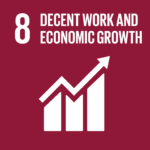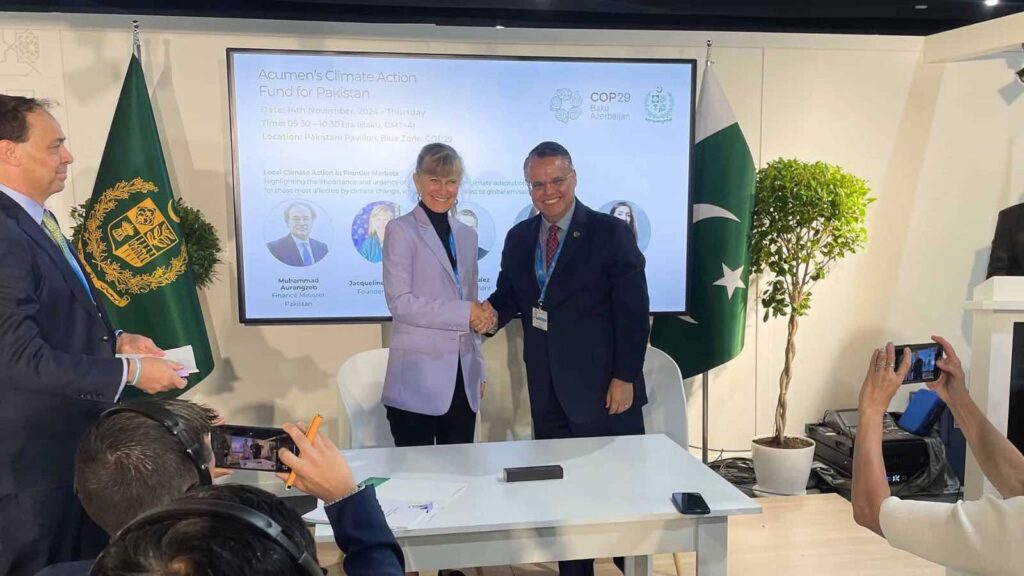With its $90 million climate finance initiative in Pakistan, Acumen seeks to demonstrate the potential of blended finance to address urgent climate and economic challenges.
Baku, Azerbaijan — At the 29th U.N. Climate Change Conference of the Parties (COP29), Acumen, a global nonprofit impact investor, announced a groundbreaking $90 million climate finance initiative focused on Pakistan’s agricultural sector. The announcement, made during a conversation at the Pakistan Pavilion with Pakistan’s Finance Minister Senator Muhammad Aurangzeb, marks the country’s first climate-focused investment dedicated to advancing agribusinesses and smallholder farmers in the face of mounting climate challenges.
RELEVANT SUSTAINABLE GOALS




Building Resilience in Pakistan’s Agriculture Sector
Acumen’s $90 million commitment aims to address the climate vulnerabilities threatening Pakistan’s agricultural system, which employs half of the workforce, drives 77% of exports, and supports 90% of farmers who are smallholders. These farmers, however, face dwindling productivity and food insecurity, exacerbated by extreme weather events and other climate impacts.
“By supporting innovative agribusiness and local supply chains, we are also supporting the millions of vulnerable smallholder farmers who grow our food,” said Dr. Ayesha Khan, Acumen’s Pakistan Country Director. “Our rapidly evolving climate requires creative financing and bold thinking that brings together both the private and public sectors to not only protect Pakistan’s food system but uplift people from poverty.”
The initiative will focus on 12 to 15 growth-stage agribusinesses, investing in farmer platforms, financial solutions, smart farming technologies, and post-harvest innovations. The overarching goal is to increase the incomes and crop yields of 13 million smallholder farmers by 2035 while creating gender-inclusive development and enhancing food security.
A Critical Moment for Pakistan’s Climate and Economy
The stakes for Pakistan’s agricultural sector are high. Although the country contributes less than 1% of global emissions, it remains one of the world’s most climate-vulnerable regions. Severe climate impacts threaten to slash GDP by 20% by 2050. Food insecurity already affects 90 million people, and agricultural productivity lags behind regional averages, leaving the sector highly exposed to external shocks.
“Together with Acumen we are continuing on our path toward sustainable economic growth and development,” said Pakistan’s Finance Minister Senator Muhammad Aurangzeb. “Their commitment to Pakistan’s agricultural system is more than a climate investment. It is an investment in the Pakistani people — the entrepreneurs, the founders, the farmers, and our communities. We look forward to supporting them on their journey to help strengthen and grow our agricultural landscape.”
A Global Strategy for Agricultural Adaptation
The Pakistan initiative is part of Acumen’s $300 million global agricultural adaptation strategy, which seeks to build climate-resilient food systems across the world. With deep expertise in climate and agricultural finance, Acumen has previously demonstrated its ability to drive transformative change through initiatives such as the Acumen Resilient Agriculture Fund (ARAF), the world’s first equity fund focused on climate resilience for smallholder farmers.
“Hard-to-reach farmers and agribusinesses are at the heart of our global agricultural adaptation efforts,” said Jacqueline Novogratz, Acumen’s founder and CEO. “This $90 million commitment will lay the foundation for sustainable change in one of the most critical and vulnerable agricultural regions on the planet.”
Since 2001, Acumen has worked to scale companies and build sustainable markets in some of the world’s most challenging regions. By investing in transformational enterprises and empowering local leaders, Acumen has impacted over 500 million lives, fostering innovative solutions to break the cycle of poverty.
With its $90 million climate finance initiative in Pakistan, Acumen seeks to demonstrate the potential of blended finance to address urgent climate and economic challenges. The commitment is not only a vote of confidence in Pakistan’s agricultural potential but a critical step toward a more resilient and sustainable future for millions of smallholder farmers.
Lead image courtesy of Acumen



